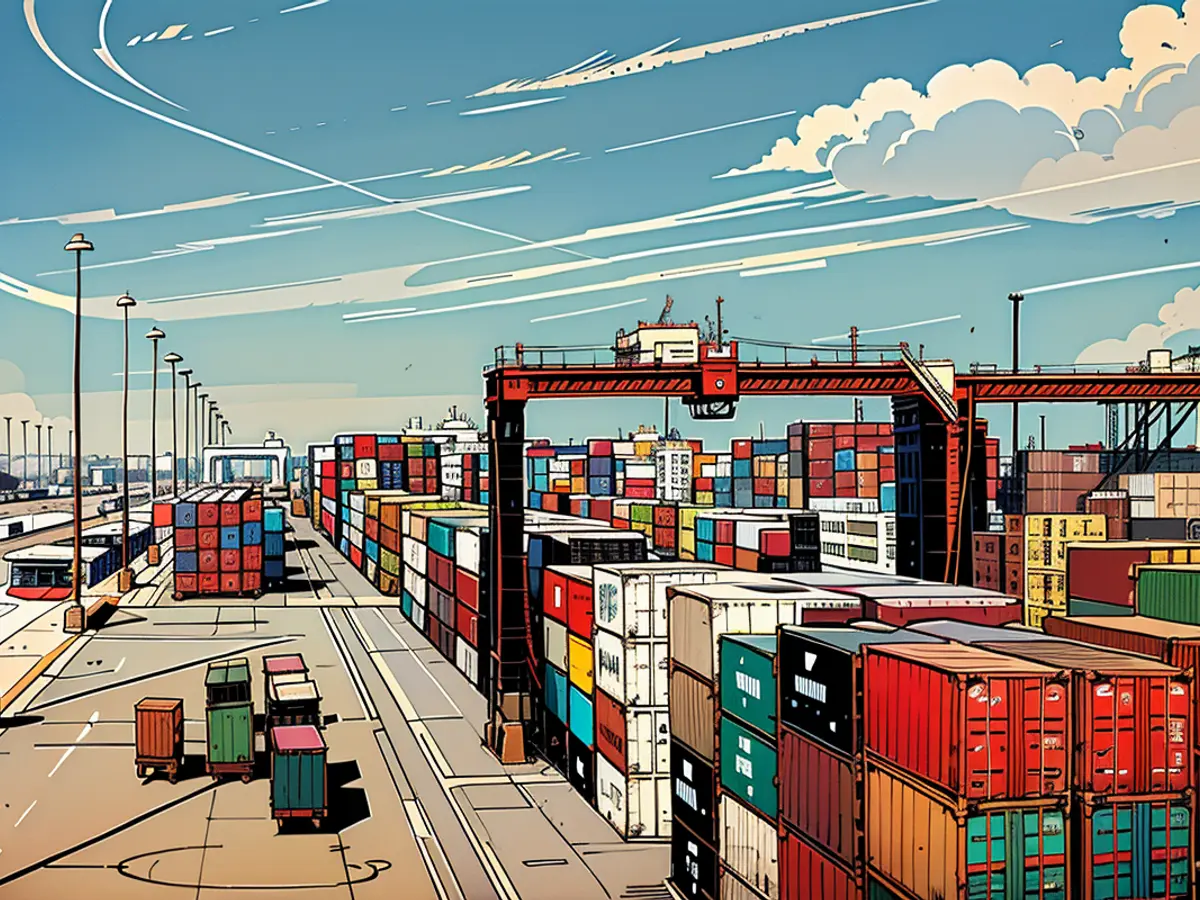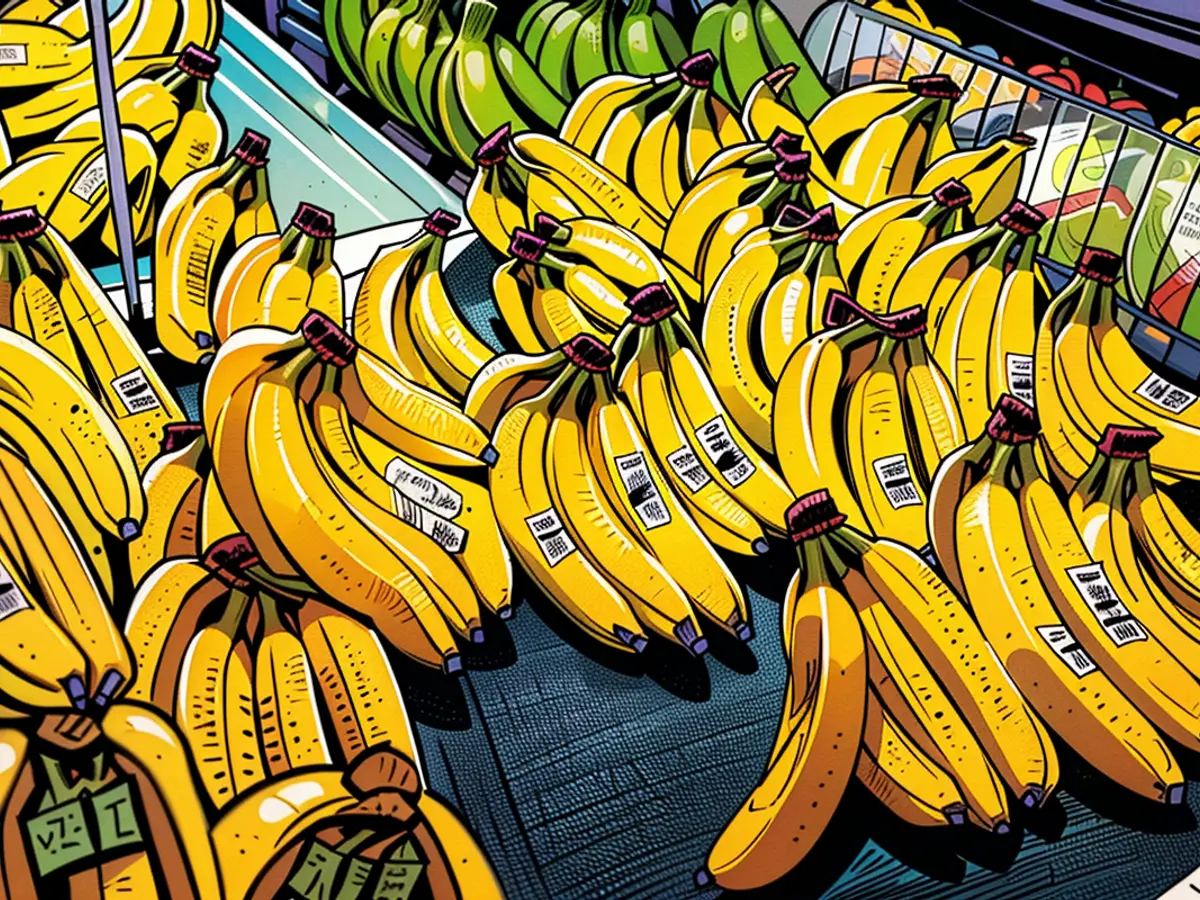Anticipate scarce supplies of bananas, alcohol, chocolate, and cherries if a protracted dockworkers' strike ensues.
Businesses have been keeping an anxious eye on the looming 12:01 am Tuesday deadline, with little indication of progress in reaching a deal to prevent a strike by tens of thousands of longshore workers. Many companies are doing whatever they can to prepare for the potential shutdown, but there are constraints.
It doesn't make financial or logistical sense to transport many of the goods that arrive at East Coast ports through alternative routes or by air. This means that America might experience shortages of items such as chocolate, alcohol, popular fruits, including bananas and cherries, and certain vehicle models if the strike lasts for an extended period. Prices for the goods that remain available could rise as a result.
Holiday shopping remains unaffected
The positive news is that your holiday shopping may not be as impacted as you might fear. Generally, 70% of the goods that retailers stock up for the holidays is already shipped through the ports by this time of year. Due to the strike threat, this percentage is even higher this year.
As Jonathan Gold, vice president of supply chain and custom policy for the National Retail Federation, told CNN, "Typically, the peak shipping season runs from July through early November. They certainly moved up their timing this year, to start in late May or early June."
Gold admitted that not all the goods that retailers plan to offer to holiday shoppers have arrived yet. "There are limitations on what you can bring in at any given point in time," he said. The retail federation and its members are worried about how long it will take to recover from even a brief strike.
"A one-day shutdown takes three to five days to recover from," he said. "The longer it goes, the worse it gets."
He said the last significant labor dispute at West Coast ports, a 2002 11-day lockout of the union workers, took six months to return to normal.
Bananas, bananas, bananas
Most of the holiday goods can be stored in warehouses or shipping containers for months at a time. However, perishable goods, such as fruits and vegetables, flow through the ports and cannot be stored for long periods. The best example of this is bananas, the most popular fruit in the United States.
The majority of the bananas consumed in the United States are imported, and 1.2 million metric tons of bananas pass through the ILA-represented ports. Over a quarter of US banana consumption comes through these ports, according to American Farm Bureau figures.
However, there are other imports at risk as well, including 90% of imported cherries and a significant portion of other fruits. While there are domestic sources of these products, such as cherries from Michigan and West Coast states, there is more demand for the product than US growers can meet.
Specialty food items, such as imported chocolate and meats from Europe, are also at risk of quickly running out of stock.
Consumers who enjoy foreign-sourced items will be affected, and these items will become more expensive at the very least.
Raw materials used by US food producers, such as cocoa and sugar, also come through the ports and are at risk of being struck. The ingredients for chocolate for Halloween have already arrived, and it may not affect production for Christmas. However, production for early next year could be affected, depending on the length of the strike, making Valentine's Day candy difficult to find.
Drink up while you still can

American imbibers have plenty of domestic options if they want a drink. However, many prefer imports from Europe, South America, or the Caribbean, such as German beer, French wine, Scotch and Irish whiskey, or rum and tequila.
Imported beverages and spirits are major products handled at the Port of New York and New Jersey, the largest port that could be shut down by this strike and the third largest in the nation.
"This potential strike comes at the worst time," Chris Swonger, CEO of the Distilled Spirits Council, told CNN. "We're gearing up for the big selling time of the year for spirits, leading into the holidays. Even a day strike could have significant consequences."
While Swonger said his members were also making early shipments ahead of the strike deadline, he admitted they haven't been able to bring in everything they need for the rest of the year.
"You could see an impact at the liquor store within a month, depending on the inventory," he said.
Additionally, 18% of the beer consumed in the United States is imported, as is 25% to 33% of the wine, and nearly all the rum. Many of these imports come through East and Gulf coast ports.
Finding the car you want
The good news is that US new-vehicle supply has nearly returned to pre-pandemic levels, according to Cox Automotive, with most European brands having inventory above industry average.
"In the near term, consumers and dealers would feel little impact from an ILA strike," said Erin Keating, executive analyst at Cox.
However, even a healthy inventory is only two to three months' worth of vehicles, with popular vehicles having a shorter supply. A long-term strike could deplete that inventory.
European automakers couldn't say how much they would be affected at this time.
"It's very difficult for us to anticipate the impact," Volkswagen spokesperson Mark Gillies told CNN. "Ultimately, even if the strike is a day or two, it will back things up."
A few years back, the scarcity of newly produced vehicles and the subsequent surge in prices were caused by the lack of essential components needed for their assembly. This predicament was due to supply shortages. Unfortunately, potential labor disputes could reintroduce these issues, affecting the supply of auto parts, not just from local sources, but even overseas markets like Europe and Asia. It's important to note that even if an automaker manages to secure most of the necessary parts through ports, they still can't complete a car with only 99% of its components.
Chris Frey, senior manager of business intelligence for Cox, stated, "With manufacturing facilities situated in the Midwest, various establishments could face consequences influenced by their operational tactics – whether they adopt just-in-time delivery or keep a stockpile." Generally speaking, the automotive industry is heavily dependent on a well-oiled, extensively coordinated supply chain. Issues within this intricate system can lead to swift and excruciating repercussions."
Despite the potential strike, most holiday goods have already been shipped and are unlikely to be significantly affected. However, perishable items like bananas and certain fruits, as well as imported foods and beverages, could see shortages and price increases due to the strike.









